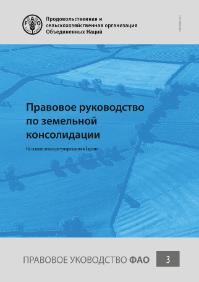The 2016 Nepal Demographic and Health Survey (NDHS) is the fifth survey of its kind to be implemented in the country as part of the worldwide Demographic and Health Surveys (DHS) Program. It was implemented by New ERA under the aegis of the Ministry of Health (MOH) of the Government of Nepal with the objective of providing reliable, accurate, and up-to-date data for the country.
Search results
Showing items 1 through 9 of 320.-
Library ResourceReports & ResearchJanuary, 2017Nepal
-
Library ResourceReports & ResearchDecember, 1979Thailand
Explores the relationship between fertility and socioeconomic and demographic variables, as well as the determinants of the acceptance of family planning in rural Thailand. Includes a bibliography.
-
Library ResourceReports & ResearchDecember, 2003Bangladesh
-
Library Resource
Правовое руководство по земельной консолидации
Manuals & GuidelinesPolicy Papers & BriefsFebruary, 2020Central Asia, EuropeКонсолидация земель - это высокоэффективный инструмент управления земельными ресурсами, который позволяет улучшить структуру сельскохозяйственных угодий и ферм в стране, что повышает их экономическую и социальную эффективность и приносит пользу как правообладателям, так и обществу в целом. Поскольку консолидация земель дает мобильность землевладению и другим правам на землю, она также может способствовать выделению новых территорий с особыми целями, отличными от сельского хозяйства, например, для общественной инфраструктуры или охраны и восстановления природы.
-
Library Resource
Based on regulatory practices in Europe
Manuals & GuidelinesLegislation & PoliciesFebruary, 2020Central Asia, EuropeLand consolidation is a highly effective land management instrument that allows for the improvement of the structure of agricultural holdings and farms in a country, which increases their economic and social efficiency and brings benefits both to right holders as well as to society in general. Since land consolidation gives mobility to land ownership and other land rights, it may also facilitate the allocation of new areas with specific purposes other than agriculture, such as for public infrastructure or nature protection and restoration.
-
Library ResourceJournal Articles & BooksJanuary, 2018Latin America and the Caribbean, South America, BrazilÉ com enorme satisfação que apresentamos o resultado dos trabalhos do III SEMINÁRIO INTERNACIONAL DE GOVERNANÇA DE TERRAS E DESENVOLVIMENTO ECONÔMICO: REGULARIZAÇÃO FUNDIÁRIA, evento realizado entre os dias, 7, 8 e 9 de junho de 2017, no anfiteatro do Instituto de Economia da Unicamp.
-
Library ResourceConference Papers & ReportsMarch, 2015South America, Brazil
Brazil has the fifth-largest national land area in the world and this land resource represents a critical asset for the country’s urban, agricultural, and economic development, also providing essential environmental services. Nevertheless, it has a historical lack of governance over its lands, failing to provide secure land rights and to control the extensive frauds resulting in public and private land grabs. The objective of this study is to depict evidence of these land grabs and propose a typology for analyzing them.
-
Library ResourceConference Papers & ReportsMarch, 2016Latin America and the Caribbean, South America, Brazil
Brazil has, on the one hand, strong institutions in various areas, improved social situation and, on the other, the rural land situation is still very precarious, with basic unresolved questions, such as for example, knowledge of what is public and private land, due to the absence of cadaster. The legislation moved forward in an attempt to link the cadasters of INCRA, the Internal Revenue Service, with information from the Registry of Real Estate with the enactment of Law No. 10,267 / 2001, creating the National Register of Rural Properties – CNIR.
-
Library ResourcePeer-reviewed publicationNovember, 2020China
The reform of collective land ownership in post-socialist contexts offers a useful window into how changes in property rights shape and structure the dynamics of territorial transformation. Focusing on China's rural revitalization campaign, this paper demonstrates how the state, as creator and regulator of land rights and property titles, facilitates landscape change by relaxing regulations over the lease of rural land and creating market institutions that favour land transfers to organized capital, in this case tourism companies and property developers.
-
Library ResourcePeer-reviewed publicationJanuary, 2017China
China has a unique land use system in which there are two types of land ownership, namely, state-owned urban land and farmer collective-owned rural land. Despite strict restrictions on the use rights of farmer collective-owned land, rural land is, in fact, developed along two pathways: it is formally acquired by the state and transferred into state ownership, or it is informally developed while remaining in collective ownership.
Land Library Search
Through our robust search engine, you can search for any item of the over 64,800 highly curated resources in the Land Library.
If you would like to find an overview of what is possible, feel free to peruse the Search Guide.










